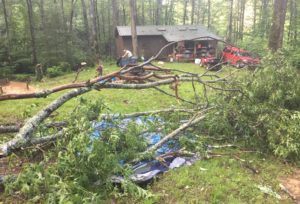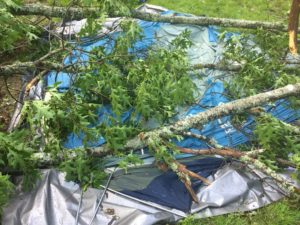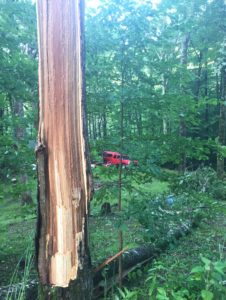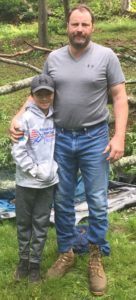Editor’s Note: Not many people have been hurt at Snowbird, our hideaway in the mountains of North Carolina. And no one has ever been killed although there has been a close call or two including the biggest, closest, call of all last Friday night.
There were seven of us on the mountain: John Sullivan, an old newspaper friend who teaches journalism at American University; his young son, Ben; and five other men. All seven of us had been to the mountain before, some many times, so we had pretty much seen it it all, or thought we had.
There was a storm coming, it would probably be a rainy night, but Ben wanted to sleep outside so he and John pitched their tent on one of the few flat spots near the cabin. My nephew, Chuck Stith, and my friend, Shane Colvard, two Alabama boys who usually sleep outside, set up next to the fire, under a canopy.
But this is John’s story so I’ll let him tell it:

“I’m not exactly sure what made us leave the tent. It might have been the lightning off in the distance, my lack of confidence in the rain fly I had hastily assembled by lantern light, or the heartburn from the smoked pork. But Ben, my 10-year-old son, and I grabbed our sleeping bags and pads and ran for the cabin.”

“By the time we had dashed 40 yards to the porch rain was falling sideways. Chuck and Shane, who were camping nearby, were holding onto metal poles supporting a canopy the wind had snatched and thrown into the air like a piece of paper. A few minutes later we heard a deafening crack.”
“Standing on the back porch of the cabin, peering into the darkness, we couldn’t see what had happened. Then a

flash of lightning illuminated the side of the hill: A tall oak tree had split open, broken off, and fallen across our tent.”
“Ben didn’t really understand what had happened, how close he and I had come to being killed. But the three men on the porch did. Chuck and Shane have kids, too. We hugged and thanked each other, and God, that we were safe.”
“The next day we surveyed the damage. The top of the oak had crushed our tent, landing

where we had laid down to sleep. One branch had left a four-inch deep impression in the ground.”
“After we got home, back to Bethesda, MD, we heard the news story about an 11-year-old girl in Indiana who had been killed by a falling tree that weekend.”
“Why her, and not us?”
Coming Monday: The Fatal Surprise
